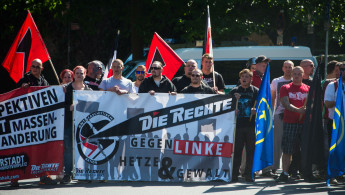Attacks against refugees increase in Germany
Attacks against refugees increase in Germany
Analysis: The rising number of attacks against centres for asylum-seekers in Germany means the extent of right-wing violence should not be underestimated, argues HRW's director.
2 min read
The severity of right-wing violence in Germany should not be underestimated, says HRW [Getty]
Increasingly frequent attacks on centres for asylum seekers in Germany shows insufficient measures have been taken by the state to combat right-wing extremism, argued Wenzel Michalski, Germany's director of Human Rights Watch.
During the first half of 2015 there were 173 attacks against asylum seeker centres according to figures from the German interior ministry.
The majority of attacks have been arson.
Right-wing extremists recently attacked police with bottles, stones and fireworks outside a refugee centre in Heidenau in Saxony, reported Michalski.
This increase in attacks is of particular concern as Germany has agreed to receive a large proportion of refugees compared with the rest of Europe.
German interior minister, Thomas de Maziere, predicts around 800,000 asylum seekers will arrive in Germany this year.
Much of the country's mainstream media and many ordinary Germans have supported the refugees. Accommodation has been organised and donations are being collected and distributed. Media commentators have also criticised the behaviour of right-wing extremists.
Videos circulating online have shown German villagers welcoming refugees to their new homes by the coachload, while football fans organised "welcome refugees" campaigns in stadia throughout the famed Bundesliga.
During the first half of 2015 there were 173 attacks against asylum seeker centres according to figures from the German interior ministry.
The majority of attacks have been arson.
Right-wing extremists recently attacked police with bottles, stones and fireworks outside a refugee centre in Heidenau in Saxony, reported Michalski.
This increase in attacks is of particular concern as Germany has agreed to receive a large proportion of refugees compared with the rest of Europe.
German interior minister, Thomas de Maziere, predicts around 800,000 asylum seekers will arrive in Germany this year.
Much of the country's mainstream media and many ordinary Germans have supported the refugees. Accommodation has been organised and donations are being collected and distributed. Media commentators have also criticised the behaviour of right-wing extremists.
Videos circulating online have shown German villagers welcoming refugees to their new homes by the coachload, while football fans organised "welcome refugees" campaigns in stadia throughout the famed Bundesliga.
| Read more: Shared goals - Germany's football fans welcome refugees |
Michalski, however, argues that the failure of German authorities to recognise the severity of right-wing violence, means xenophobic and homophobic attacks are often trivialised.
He called for greater measures to be taken against right-wing extremism, including better policing of asylum centres, and for the police to be more sensitive to right-wing violence.
"Clearly, Germany still has a lot to do and needs to do it quickly," he argued.



